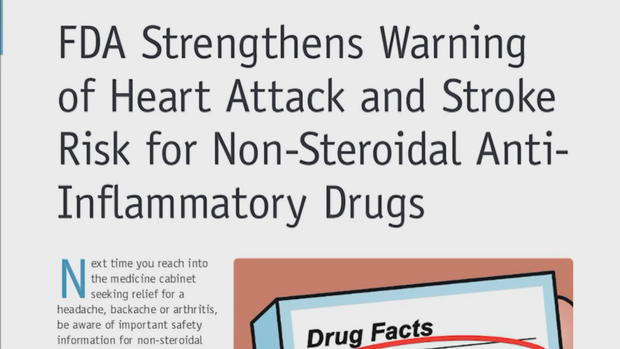Will Ibuprofen Or Aleve Cause A Heart Attack? New FDA Warning
We've worried about a possible link between pain relievers/arthritis pills and heart attacks for a long time. Even back in 2005 the Food and Drug Administration said these drugs "might" increase your chances of a heart attack or stroke.
Now they are saying they "will."
The problem is we don't know how much it takes -- it doesn't seem like a single pill will trigger a heart attack of stroke -- the risk seems increase about a week or more after taking them consistently. We are not sure why they increase the risk. And we aren't really sure which of these drugs is worse than another … so this is going to be a blanket warning.
That means the warning not only goes on over-the-counter products but for the entire class of medications called NSAIDS, which is shorthand for "Non- Steroidal Anti Inflammatory Drugs." NSAIDS include prescription pain and arthritis pills. That's a lot of medications.
And the warning is for EVERYONE -- the higher risk of heart attack is being seen even in people with no history of heart problems.
So here's what you need to know:
Once again, a single pill is probably not going to do you in but there's more and more research that shows people who take these drugs for more than a week are rolling the dice.
If you have a history of heart disease or even risk factors, check with your doctor before using any of these medications.
Avoid them if you have high blood pressure. They will make your pressure rise.
What can you use? The American Heart Association says if you need a pain reliever, Tylenol should be your first choice. It is not an NSAID.
If you get the go-ahead to use something, the best rule is to take the smallest amount for the shortest period of time. More is not always better -- or necessary. Also use lots of caution with OTC cough and cold meds -- they often contain ibuprofen or Aleve-type ingredients.
Here's a partial list of NSAIDS courtesy of the FDA:
| Generic name | Brand name(s) |
| celecoxib | Celebrex |
| diclofenac | Cambia, Cataflam, Dyloject, Flector, Pennsaid, Solaraze, Voltaren, Voltaren-XR, Zipsor, Zorvolex, Arthrotec (combination with misoprostol) |
| diflunisal | No brand name currently marketed |
| etodolac | No brand name currently marketed |
| fenoprofen | Nalfon |
| flurbiprofen | Ansaid |
| ibuprofen* | Advil, Caldolor, Children's Advil, Children's Elixsure IB, Children's Motrin, Ibu-Tab, Ibuprohm, Motrin IB, Motrin Migraine Pain, Profen, Tab-Profen, Duexis (combination with famotidine), Reprexain (combination with hydrocodone), Vicoprofen (combination with hydrocodone) |
| indomethacin | Indocin, Tivorbex |
| ketoprofen | No brand name currently marketed |
| ketorolac | Sprix |
| mefenamic acid | Ponstel |
| meloxicam | Mobic |
| nabumetone | No brand name currently marketed |
| naproxen* | Aleve, Anaprox, Anaprox DS, EC-Naprosyn, Naprelan, Naprosyn, Treximet (combination with sumatriptan), Vimovo (combination with esomeprazole) |
| oxaprozin | Daypro |
| piroxicam | Feldene |
| sulindac | Clinoril |
| tolmetin | No brand name currently marketed |
*There are many over-the-counter (OTC) products that contain this medicine. Look for the word "ibuprofen" or "naproxen" in the list of ingredients.
Dr. Dave Hnida is CBS4's Medical Editor. He blogs about the latest studies and trends in the health world. Read his latest blog entries, check out his bio or follow him on Twitter @drdavehnida




